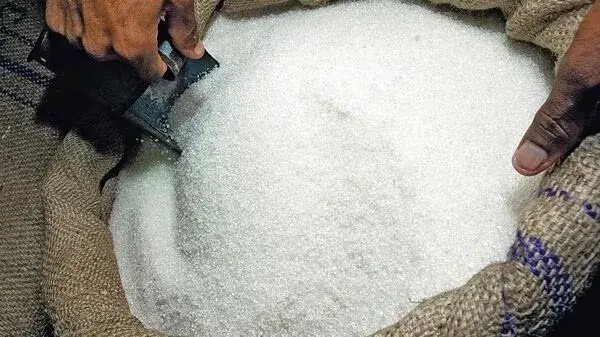Sugar Stocks Soar as Government Lifts Ban on Sugarcane Juice for Ethanol Production
Sugar stocks experienced a significant surge in response to a government order reversing the ban on using sugarcane juice for ethanol production. Bajaj Hindusthan Sugar led the gains, recording a 7.7% increase, as major stocks rose in today’s trading session. The government’s decision to allow both sugarcane juice and B-heavy molasses for green fuel production in the 2023–24 supply year followed its earlier ban on using sugarcane juice or sugar syrup for ethanol production in the same period. This reversal prompted a positive market response, with notable gains in major sugar stocks. In accordance with the updated order, various stocks saw substantial increases, including Dhampur Sugar Mills (6.59%), Dalmia Bharat Sugar (6%), Uttam Sugar Mills (5.7%), Sakthi Sugars (5.2%), Balrampur Chini Mills (5.1%), Rajshree Sugars & Chemicals (5%), Praj Industries (4.46%), and Triveni Engineering (3.8%). The food ministry’s directive to all sugar mills and distilleries outlined that oil marketing companies (OMCs) would issue a “revised allocation” of “sugarcane juice and B heavy molasses-based ethanol” for the 2023–24 supply year to each distillery. OMCs were instructed to inform the food ministry after placing revised contracts. Following the revised allocation, sugar mills and distilleries are required to supply ethanol strictly according to the revised quantity of cane juice and B-heavy molasses. The government’s move to ensure sufficient sugar supply in the domestic market, in light of inadequate rainfall affecting India’s sugarcane crop, had earlier led to a ban on sugar exports. With an estimated decline in sugar production to 32.3–33 million tonnes in the 2023–24 season, compared to 37.3 million tonnes in the previous season, and domestic consumption projected to be around 28–29 million tonnes, the government aims to navigate the balance between market demand and ethanol production. India has made strides in ethanol blending, surpassing its 10% blending target for the Ethanol Supply Year 2021–22 by June 2022. The country is now ambitiously targeting a 20% blending rate by 2025–26, aligning with its commitment to enhance biofuel utilization in the national energy mix, a commitment reinforced during the recent G20 summit with the introduction of the Global Biofuels Alliance.
Sugar Stocks Soar as Government Lifts Ban on Sugarcane Juice for Ethanol Production Read More »

